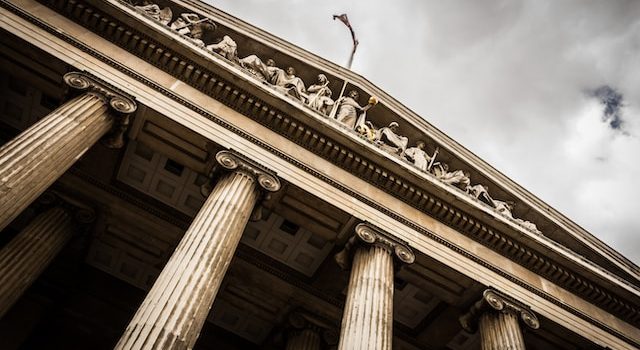
Introduction
In the turbulent landscape of contemporary politics, a stern warning echoes from a seasoned political figure Cheney. As we delve into the potential ramifications of a second term for Trump, we unravel the complexities surrounding the rule of law. This exploration is guided by Cheney’s insights, a political stalwart with a history of candid assessments, urging us to critically examine the threats posed to democratic principles.
Cheney’s Alarming Assessment
The Unsettling Vision for Trump’s Second Term Cheney’s alert centers on the potential erosion of the rule of law in the event of Trump’s return to office. We delve into Cheney’s concerns, analyzing the policies, rhetoric, and executive actions that could pose significant challenges to the fundamental principles that underpin our legal system.
The Executive Branch and Checks on Power
Balancing Act or Breakdown? A cornerstone of the rule of law lies in the checks and balances inherent in a democratic system. Cheney’s warning prompts us to scrutinize how a second Trump term might impact these crucial mechanisms. From executive orders to appointments, we assess the potential consequences for the delicate balance of power.
Ignoring Court Orders: A Direct Challenge
One of the most alarming indications of a disregard for judicial authority comes from recent whistleblower claims in the Justice Department. According to former DOJ attorney Erez Reuveni, senior official Emil Bove suggested defying court orders to deport detainees accused of gang affiliations—proposing that the department simply “ignore” unfavorable rulings. If a future administration treats court decisions as optional, it would breach a core democratic principle: that the judiciary has the final say on legal disputes.
Weaponizing Federal Agencies
Under Trump’s first term, agencies like Immigration and Customs Enforcement (ICE) expanded their enforcement tactics in ways critics say aligned with political goals. Despite falling border crossings, ICE increased raids—sometimes detaining even U.S. citizens—and deployed masked agents in American cities in measures compared to authoritarian regimes. In a second term, fears grow that ICE and other agencies (DHS, DOJ) could be further politicized to target opponents, chilling dissent and undermining civil liberties.
Project 2025: Blueprint for Authoritarian Shift
Beyond day-to-day tactics, Project 2025 outlines a broader plan for restructuring the federal government to concentrate power in the presidency. Critics like NYU scholar Ruth Ben-Ghiat describe it as an “authoritarian takeover” aiming to dismantle neutral civil service protections and install loyalists across agencies. Such a shake-up would undercut the independence of regulatory bodies, hamper enforcement of environmental or financial safeguards, and erode the legal culture that restrains executive overreach.
Eroding Democratic Norms and Civil Society
A recent thematic review warns that constitutional democracy in the U.S. faces a rapid assault under a second Trump administration, with universities, courts, the press, and legal professionals coming under political pressure. When key pillars—free press, independent judiciary, academic freedom—are intimidated, the feedback loops that correct governmental error weaken. Citizens lose trust in public institutions, and democracy’s self-correcting mechanisms falter.
Targeting Political Opponents
Trump’s first term set a precedent for directing investigations at political enemies. An emerging pattern under his reelection campaign shows potential use of the DOJ to open probes into critics, judges, and even private citizens who “get on the president’s bad side”. This approach weaponizes law enforcement, shifting it from neutral arbiter to political tool—a direct threat to equal application of the law.
Press Freedom Under Siege
An emboldened second term could see continued efforts to restrict media access. Already, certain outlets face blacklists and lawsuits for unfavorable coverage, while networks supportive of Trump receive privileged treatment. By controlling which journalists gain White House access and penalizing critical voices, the administration undermines the First Amendment and the essential watchdog role of a free press.
Judicial Independence at Risk
Senator Lisa Murkowski’s recent dissent highlights worry among some Republicans about Trump’s impact on the courts: from stacking federal benches with loyalists to demanding nominees who will side with executive authority a move that threatens judicial checks on power and she warns of “erosion of U.S. democratic norms”. If judges fear retribution or career harm for ruling against the administration, they may hesitate to enforce constitutional limits on presidential actions.
Implications for Civil Rights and Liberties
When courts and agencies lose independence, civil rights suffer. Lawsuits challenging discriminatory policies or defending protest rights become fraught if the DOJ refuses to defend rulings it dislikes. The chilling effect extends to marginalized communities, who rely on judicial protection against overreaching government power. A second Trump term risks reversing progress on voting rights, immigration relief, and anti-discrimination protections.
International Credibility and Rule of Law
America’s global standing rests on its image as a rule-of-law democracy. If the U.S. executive repeatedly defies court orders, politicizes agencies, and silences dissent, foreign partners may question treaty commitments and legal arbitration. Authoritarian rivals seize on U.S. backsliding to justify their own abuses, further weakening democratic norms worldwide.
Threats to Judicial Independence
Navigating the Legal Landscape Cheney’s concerns extend to the judiciary, a vital institution for upholding the rule of law. We examine the potential challenges to judicial independence and the long-term implications for the legal landscape. Will the judiciary remain a steadfast guardian of constitutional principles, or will political considerations taint its integrity?
1. Assault on Democratic Norms:
Cheney’s Call for Vigilance Cheney’s warning goes beyond legal intricacies to encompass the broader democratic norms that shape our political culture. We explore the potential assault on norms such as a peaceful transition of power, respect for a free press, and the independence of law enforcement. Understanding these broader implications is essential for safeguarding the essence of democracy.
2. Citizen Engagement and the Rule of Law:
A Call to Action Cheney’s alert is not merely a passive observation but a call to action. We explore the role of informed citizenry in upholding the rule of law. From civic education to active participation, we analyze how individuals can contribute to the resilience of democratic institutions in the face of potential challenges.

Visual Table for Key Points:
| Scenario | Impact on Rule of Law |
|---|---|
| Upholding norms | Maintains stability |
| Erosion of checks | Challenges to democracy |
| Strengthening judiciary | Resilience in legal system |
Safeguarding the Rule of Law
Preventing erosion requires active measures:
- Congressional Oversight: Regular inquiries into agency compliance with legal norms and whistleblower protections.
- Judicial Vigilance: Courts must reaffirm their authority to enforce rulings swiftly and hold officials in contempt if they refuse compliance.
- Civil Society Engagement: Nonprofits, bar associations, and media watchdogs must document and publicize abuses, maintaining public awareness.
- Voter Participation: Electing leaders committed to checks and balances—supporting candidates who respect judicial independence and free press.
By reinforcing democratic institutions, citizens help ensure that no president stands above the law
Conclusion
As Cheney’s warning reverberates through the political landscape, the potential consequences of Trump’s second term on the rule of law demand careful consideration. This exploration serves as a call to vigilance, urging citizens and policymakers alike to scrutinize the implications for democratic principles. Whether through the erosion of checks and balances or threats to judicial independence, understanding the dynamics at play is crucial for safeguarding the core tenets of our legal system.










